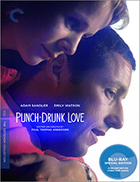Punch-Drunk Love
|  Paul Thomas Anderson’s Punch-Drunk Love has long been referred to as “the Adam Sandler movie for people who hate Adam Sandler,” and Anderson himself has described it as “an art-house Adam Sandler film.” Obviously, this is a film that immediately presents a conceptual challenge: In short, what is it? How to describe a film by a respected auteur starring a comedian who specializes in playing infantile dimwits and whose primary audience is drunk college students? After all, the film is singularly built around the presence of former Saturday Night Live star Adam Sandler, who has starred primarily in low-brow comedies that his fans love and everyone else loathes. Anderson, who after Boogie Nights (1997) and Magnolia (1999) was hailed as one the most promising of young American directors, claims to enjoy Sandler movies (which couldn’t be any different from the ones he makes), and he wrote Punch-Drunk Love with only Sandler in mind for the lead role. Sandler stars as Barry Egan, an almost pathologically shy man who owns a small business that makes novelty plungers. Wearing a ridiculous blue suit and holding himself as if he constantly expects the worst to happen, Barry is a strange protagonist, but hardly one that is out of line with Sandler’s previous characters. Despite his shy demeanor and reluctance to assert himself, Barry has a serious anger-management problem that leads to his exploding into sudden fits of furious violence. Part of this is likely due to Barry’s seven older sisters, who constantly fuss over him and nag him and refuse to leave him alone. They’re like a seven-headed self-esteem vacuum, sucking out every last bit of Barry’s dignity while professing to do it “for his own good.” The narrative around Barry’s character is as bizarre and absurd as he is, constructed largely out of a series of more-or-less unrelated occurrences that are defined primarily by their randomness. Anderson establishes the tone of the film from the very beginning, as we first see Barry working alone in his warehouse-office hours before anyone else has arrived. He wanders out into the alleyway, witnesses a sudden and otherwise unexplained car wreck, and then sees a truck pull up and drop a harmonium into the middle of the street. And it only gets weirder from there. As Punch-Drunk Love is a romantic comedy, the crux of the story is Barry’s growing relationship with a wide-eyed, gentle woman named Lena Leonard (Emily Watson), whose attraction to Barry is quite inexplicable in “normal” terms. But, that may be the key to what this film is, namely a self-conscious revision of the romantic-comedy genre. We can see Anderson laying bare the essentially serendipitous nature of movie romance by building an entire story around one that makes little sense. There is more, though—much more. Barry is also the unwitting victim of a scam involving a phone-sex operator who has taken his personal information and credit-card number and is using it to extort money from him. Meanwhile, Barry’s one act of assertiveness is his plan to exploit a loophole in a Healthy Choice/American Airlines promotional deal in which he can buy $3,000 worth of pudding and amass so many frequent flyer miles that he would never have to buy another plane ticket again (which is based, by the way, on a real-life incident). Of course, the irony is that, when he needs to fly somewhere during the film, he can’t use the scheme because it takes six to eight weeks to process. Anderson’s previous two films were sprawling, multi-character epics, and somehow he manages to infuse the same overall feeling into Punch-Drunk Love even though it is only an hour and a half in length. It feels longer, though, mostly because of the random nature of the narrative. It’s impossible to see where the story is headed (which is part of its charm), and thus it’s also impossible to tell when it’s drawing to a close. Anderson gives us some important elements of the romantic formula, namely a reuniting of Barry and Lena in a picturesque moment in Hawaii and Barry’s eventually facing down the man behind the phone-sex scam (Philip Seymour Hoffman), although the result is not quite what you would expect. All of this is in there, but it feels stirred up, mixed around, and toyed with, but not complete. Anderson is playing with the conventions and reinventing them at the same time, although it’s doubtful anyone will follow his lead. Nonetheless, he has produced a visually gorgeous film, one that makes exquisite use of widescreen composition, bold color schemes, and evocative moments of silhouette, all of which is set to an intriguing and incessant percussion score by Jon Brion (Magnolia) that is so constantly out of place that it fits perfectly. He also boldly uses moments of sudden, unexpected violence, which reminded me of George Roy Hill’s The World According to Garp (1982), which is also an absurdist violent comedy. There have been conflicting opinion about Sandler’s performance here, with one side arguing that he has found new depths as an actor, while others say that he is the same blank-eyed moron as he was in his previous films and the only difference here is that he has a brilliant director making him look good. I think Sandler has reached in and found new depths to his persona, with the only disappointment being that he is essentially still playing the same character he always has—benign, goofy but likable, with a hidden inner rage that is played for laughs. That his inner rage is more disturbing in Punch-Drunk Love seems to be the breakthrough; what had previously been used (quite uncomfortably at times) for slapstick nonsense is now explored in comedic terms as a serious psychological disorder, albeit one that serves Barry well when he finally gets fed up at being intimidated and bullied. Ultimately, Punch-Drunk Love is an interesting, but slight work, an experimental stab at reinvention for both star and director. If we are to find a concept in here somewhere, it has to be “the unexpected,” with both Anderson and Sandler trying to do that which no one expected them to do (for Anderson, it’s making a goofy Adam Sandler project, for Sandler it’s starring in an arty P.T. Anderson film), even though neither one of them ends up stretching as far as he thinks he is.
Copyright © 2016 James Kendrick Thoughts? E-mail James Kendrick All images copyright © The Criterion Collection / Sony Pictures Home Entertainment | |||||||||||||||||||||||||||||||||||
Overall Rating: 

 (3)
(3)


